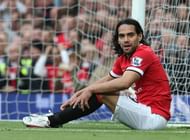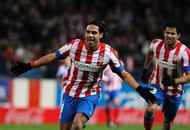When Manchester United took Radamel Falcao on loan last season, fans and pundits alike were excited at the prospect of the Colombian hit man gracing the turf at Old Trafford. Before he suffered the tear to his anterior cruciate ligament (ACL) in his left knee in a French Cup tie, Falcao was one of the most sought-after strikers in world football, producing devastating performances of strength, speed and marksmanship – most notably against Chelsea in the 2012 UEFA Super Cup Final and Real Madrid in the 2013 Copa Del Rey.
Despite his remarkable return to fitness, he missed the 2014 World Cup and it was hoped that pulling on the red of United would reignite Falcao, continuing where he left off. However, commanding a £265,000 per week salary and a £6 million loan fee, added on the pressure for success.
Where did it all go wrong for Falcao?
With a return of four goals and four assists in 29 games and a single shot on target in his final 12 Premier League appearances for Manchester United, Falcao’s time in England was universally deemed as a failure. However, he joined a United side retracing their steps, rebuilding their team on the pitch and trying to restore their former glory and continue where they left off a few seasons ago. Sound familiar?
It took Louis van Gaal time to adapt to the Premier League. He experimented with different players, systems and tactics and only towards the latter part of the season did he turn around the Red Devils season and guide them to Champions League football.
This is a difficult environment for a South American footballer, returning from a career-threatening injury to cut his teeth – Angel Di Maria came to United straight after scoring the winning goal in the 2014 Champions League final and look at the disappointment he endured during this season.
Despite the statistics, we saw numerous glimpses of the precise and clever movements in behind oppositions defences, timing runs to perfection. What we failed to see was end product – and by that I mean the electric burst of pace and ruthless finishing we had grown accustomed too. His work rate and industry could not be faulted either, he showed hunger and desire when off the ball, closing down the opposition and forcing mistakes (the home match vs Newcastle United springs to mind).
However, towards the end of the season and after being demoted to the reserves in March, I began to feel a great deal of sympathy for Radamel Falcao. He was a shadow of his former self but, to his credit, maintained a fantastic level of professionalism throughout (look at the way he applauded the support in his final game). He seems a very humble man, one who was as disappointed as the rest of us with his performances at Old Trafford.
How Mourinho can help Falcao succeed
In my opinion, it was the ‘body failing the mind’ last season for Falcao, who I think will be a success at Chelsea. He won’t return to the player he was a few years ago, but I believe Jose Mourinho will heal the psychological wound of last season and help the Colombian to reassert himself in the eyes of world football, by facilitating Falcao to make a subtle, but key contribution to Chelsea’s season.
“For a player of his level and quality, it’s a real shame people in England think Falcao is the player who was at Manchester United.” – Mourinho
If you look at a Chelsea’s squad, Mourinho thrives on working with players with hunger, with something to prove and a desire to continue their development, at the start or end of their careers. Hernan Crespo and Samuel Eto’o were both players who felt they had something to prove by playing in the Premier League and they managed to contribute to Chelsea’s success despite playing second fiddle for the most part of their time at Stamford Bridge.
It is likely Falcao won’t play week in week out, however Drogba still managed to clock up 40 appearances last term, despite being brought in as ‘backup’ to Diego Costa. Chelsea’s schedule won’t get any less hectic this season, so Falcao can be prepared to rack up some game time. Furthermore, barring an injury at the current Copa America tournament, Falcao will also be much more physically fit and equipped for the Premier League next term.
Chelsea’s style of play will undoubtedly suit Falcao’s attributes. Their strengths this season have been their ability to attack down both flanks, the use of their full backs in attacking situations, creating chances through individual skill and the lethal conversion of goal scoring opportunities. Last season, Manchester United played at a slow tempo, building and retaining possession and waiting for the opposition to make an error for them to exploit.
Falcao played predominantly with his back to goal and only on a few occasions did he look to run in behind the defence. With Eden Hazard and Cesc Fabregas, Chelsea will create more goal scoring opportunities for Falcao and that is why I believe he will find his feet and start to rediscover his goalscoring potency, especially when the opposition are fatigued after 70 minutes of Diego Costa giving them a roughing up.
Although, perhaps Costa and Falcao could strike up the old partnership? Despite not seeing eye to eye, the pair were a tremendous success at Atletico Madrid, but with the roles reversed and Costa being the main striker, who knows how that relationship will develop.
Falcao has got a second chance, a second opportunity with all the cards (Chelsea’s style of play, his fitness levels, experience) stacked in his favour, which at United, he did not. However, I think this adds even more pressure than last season; he is at the perfect club, with the best manager to help him get his reputation restored.
If there is no improvement shown this season, who knows what next for Falcao. A £35m price tag for next summer? Everyone will be watching and paying close attention.


